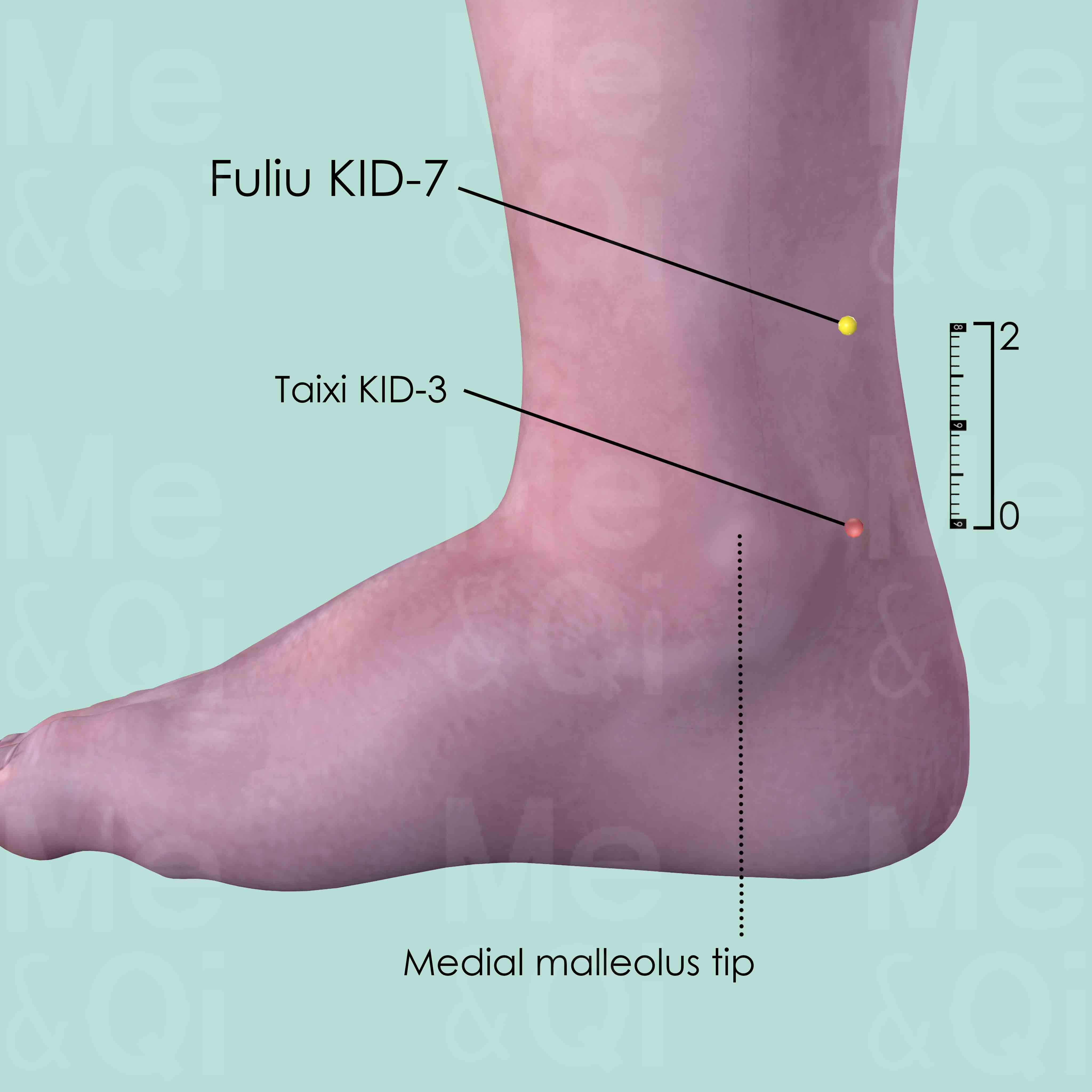Cold Kneesaccording to TCM
Symptom families: Joint Symptoms, Knee Conditions
What is Cold Knees?
"Cold knees" is a descriptive term for a sensation of chill or lack of warmth in the knee joints, often accompanied by discomfort or weakness. This symptom can significantly affect mobility and the ability to perform activities that require knee movement.
While it's common to feel a drop in temperature in the knees after sitting still for a prolonged period or in a cold environment, persistent coldness, particularly when it's not related to external conditions, may indicate an underlying health issue.
How does TCM view Cold Knees?
In the philosophy of Traditional Chinese Medicine, symptoms like cold knees are signs pointing to a 'pattern' of imbalance in the body. A pattern is a comprehensive diagnosis that takes into account not just the symptom, but the whole person, including their Qi (energy flow), lifestyle, emotional state, and more.
It is vital to discern these patterns, as they guide how practitioners approach treatment — focusing not on the symptom in isolation but on the entire pattern to restore balance within the body’s system.
Root Causes of Cold Knees in TCM
In TCM, the sensation of cold knees is typically linked to a Yang Deficiency in the Kidneys and Spleen, resulting in a diminished warming function that fails to maintain adequate temperature and vitality in the knees. The Kidneys are the source of all Yin and Yang energies in the body, and when Yang is deficient, symptoms like cold knees can manifest.
The spleen, in concert with the Kidneys, supports muscle strength and function – weaknesses in this organ can contribute to such cold sensations as well. Recognizing the precise pattern of deficiency is crucial in TCM, guiding the practitioner to select suitable warming and tonifying treatments.
Explore below more details about what might cause Cold knees according to TCM.
- By Syndrome
- By Organ
- Yang Deficiency
- Kidney
- Spleen
Yang Deficiency
Yang deficiency in TCM refers to a state where the body's Yang energy, which is responsible for warmth, activity, and function, is weakened or diminished. This pattern of disharmony often arises from chronic illness, aging, or inherent constitutional weakness. Symptoms of Yang deficiency are typically associated with cold and sluggishness, such as a feeling of coldness, cold extremities, pale complexion, low energy or fatigue, and a desire for warmth. Digestive issues like poor appetite, loose stools, and water retention can also be indicative of Yang deficiency.... see more
Yang Deficiency Patterns That Can Lead to Cold Knees
Common Symptoms: Lower Back Pain Chills Weak Legs Bright Pale Face Erectile Dysfunction Premature Ejaculation Oligospermia Low Sex Drive
| Pattern Name | Relevant Symptoms | Relevant Formulas |
|---|---|---|
| Kidney and Spleen Yang Deficiency | Cold and weak knees, Lower back pain, Weak and cold knees, Back cold sensation, Chills, Weak legs, Bright pale face, Erectile dysfunction, Premature ejaculation, Oligospermia, Watery ejaculate, Low sex drive, Generalized fatigue, General weakness, Clear urination, Nocturia, Apathy, Leg edema, Female infertility, Diarrhea, Depression, Lack of appetite, Slight abdominal distention, Desire to lie down... see more | Li Zhong Wan |
| Kidney Yang Deficiency | Cold and weak knees, Lower back pain, Dizziness, Tinnitus, Weak and cold knees, Lower back coldness, Chills, Weak legs, Bright pale face, Generalized fatigue, General weakness, Leg edema, Female infertility, Diarrhea, Depression, Erectile dysfunction, Premature ejaculation, Oligospermia, Low sex drive, Pale and abudant urination, Constipation... see more | Ba Wei Di Huang Wan | You Gui Wan | Er Xian Tang | Shen Qi Wan | Wu Zi Yan Zong Wan | Tu Si Zi Wan | Ji Chuan Jian |
Kidney
In TCM the Kidneys are regarded as the body's most fundamental reservoir of Essence, known as Jing, which influences growth, reproduction, and aging. They are not just organs for filtering blood, but a holistic system governing vital life forces. When the Kidneys malfunction in TCM, it can manifest as a variety of health issues, such as chronic fatigue, reproductive problems, imbalances in fluid metabolism leading to edema or dryness, lower back pain, and a sense of fear or insecurity.... see more
Kidney Patterns That Can Lead to Cold Knees
Common Symptoms: Lower Back Pain Chills Weak Legs Bright Pale Face Erectile Dysfunction Premature Ejaculation Oligospermia Low Sex Drive
| Pattern Name | Relevant Symptoms | Relevant Formulas |
|---|---|---|
| Kidney and Spleen Yang Deficiency | Cold and weak knees, Lower back pain, Weak and cold knees, Back cold sensation, Chills, Weak legs, Bright pale face, Erectile dysfunction, Premature ejaculation, Oligospermia, Watery ejaculate, Low sex drive, Generalized fatigue, General weakness, Clear urination, Nocturia, Apathy, Leg edema, Female infertility, Diarrhea, Depression, Lack of appetite, Slight abdominal distention, Desire to lie down... see more | Li Zhong Wan |
| Kidney Yang Deficiency | Cold and weak knees, Lower back pain, Dizziness, Tinnitus, Weak and cold knees, Lower back coldness, Chills, Weak legs, Bright pale face, Generalized fatigue, General weakness, Leg edema, Female infertility, Diarrhea, Depression, Erectile dysfunction, Premature ejaculation, Oligospermia, Low sex drive, Pale and abudant urination, Constipation... see more | Ba Wei Di Huang Wan | You Gui Wan | Er Xian Tang | Shen Qi Wan | Wu Zi Yan Zong Wan | Tu Si Zi Wan | Ji Chuan Jian |
Spleen
In TCM the Spleen plays a vital role in digestion and transformation, converting food into energy and nutrients, and overseeing the distribution of Qi and Blood. It's also crucial in maintaining the health of muscles and limbs and ensuring the blood remains within the vessels. When the Spleen malfunctions in TCM, it can lead to a variety of issues such as digestive disorders, fatigue, weak muscles, bloating, and a feeling of heaviness. It can also cause a pale complexion, poor appetite, and a tendency to bruise easily. Emotionally, a Spleen imbalance is often associated with excessive worry or overthinking, reflecting its role in the interplay between physical and mental health.... see more
Spleen Patterns That Can Lead to Cold Knees
| Pattern Name | Relevant Symptoms | Relevant Formulas |
|---|---|---|
| Kidney and Spleen Yang Deficiency | Cold and weak knees, Lower back pain, Weak and cold knees, Back cold sensation, Chills, Weak legs, Bright pale face, Erectile dysfunction, Premature ejaculation, Oligospermia, Watery ejaculate, Low sex drive, Generalized fatigue, General weakness, Clear urination, Nocturia, Apathy, Leg edema, Female infertility, Diarrhea, Depression, Lack of appetite, Slight abdominal distention, Desire to lie down... see more | Li Zhong Wan |
TCM Herbal Formulas for Cold Knees
To counteract cold knees, TCM prescribes herbal formulas that bolster the body's Yang energy. Li Zhong Wan, with its key ingredient Dried Ginger (Gan Jiang), warms the middle and dispels cold, addressing the deficient heat within the body. For deeper Kidney Yang Deficiency, Ba Wei Di Huang Wan, featuring Prepared rehmannia (Shu Di huang), nourishes the body's Yin while subtly supporting Yang, illustrating the intricate balance sought in TCM pharmacology.
Explore below some TCM herbal formulas used to address cold knees, organized by cause and by formula type.
- By Cause
- By Formula Type
- Yang Deficiency
- Formulas that warm yang and tonify
- Formulas that warm the middle and dispel cold
- Formulas that nourish yin and tonify
- Formulas that tonify yin and yang
- Formulas that moisten intestines and unblock bowels
Top Formula for Yang Deficiency:
Li Zhong Wan
Suitable for Yang Deficiency patterns that may cause cold knees, such as Kidney and Spleen Yang Deficiency
Learn moreAll Formulas Recommended for Cold Knees Caused by Yang Deficiency
| Formula | Patterns Suitable For |
|---|---|
| Li Zhong Wan | Kidney and Spleen Yang Deficiency |
| Ba Wei Di Huang Wan | Kidney Yang Deficiency |
| You Gui Wan | Kidney Yang Deficiency |
| Er Xian Tang | Kidney Yang Deficiency |
| Shen Qi Wan | Kidney Yang Deficiency |
| Wu Zi Yan Zong Wan | Kidney Yang Deficiency |
| Tu Si Zi Wan | Kidney Yang Deficiency |
| Ji Chuan Jian | Kidney Yang Deficiency |
Formulas that warm Yang and tonify
These formulas are suitable for some cold knees-causing patterns like Kidney Yang Deficiency.
One such formula is You Gui Wan, with prepared aconite as a key herb.
Other formulas of this category are listed in the table below.
All "formulas that warm yang and tonify" recommended for cold knees
| Formula | Patterns Suitable For (if applicable) |
|---|---|
| You Gui Wan | Kidney Yang Deficiency |
| Shen Qi Wan | Kidney Yang Deficiency |
| Wu Zi Yan Zong Wan | Kidney Yang Deficiency |
| Tu Si Zi Wan | Kidney Yang Deficiency |
Formulas that warm the middle and dispel Cold
These formulas are suitable for some cold knees-causing patterns like Kidney and Spleen Yang Deficiency.
One such formula is Li Zhong Wan, with dried ginger as a key herb.
Formulas that nourish Yin and tonify
These formulas are suitable for some cold knees-causing patterns like Kidney Yang Deficiency.
One such formula is Ba Wei Di Huang Wan, with prepared rehmannia as a key herb.
Formulas that tonify Yin and Yang
These formulas are suitable for some cold knees-causing patterns like Kidney Yang Deficiency.
One such formula is Er Xian Tang, with curculigo rhizome as a key herb.
Formulas that moisten Intestines and unblock bowels
These formulas are suitable for some cold knees-causing patterns like Kidney Yang Deficiency.
One such formula is Ji Chuan Jian, with desert-living cistanche as a key herb.
Acupoints for Cold Knees
TCM acupuncture involves specific points to address cold knees, with the aim of stimulating the body's innate healing energies. Points like Fuliu KID-7 and Taixi KID-3 on the Kidney Channel work to tonify the kidneys and resolve dampness, which, in turn, can alleviate the coldness.
Similarly, Shenshu BL-23 on the Bladder Channel is believed to strengthen Kidney Yang and nourish Yin. By choosing these acupoints, TCM practitioners aim to restore the fundamental energy needed to warm the knees and improve joint function.
Explore below some acupoints used to address cold knees, organized by meridian.
- By Meridian
- Kidney Channel
- Bladder Channel
- Governing Vessel
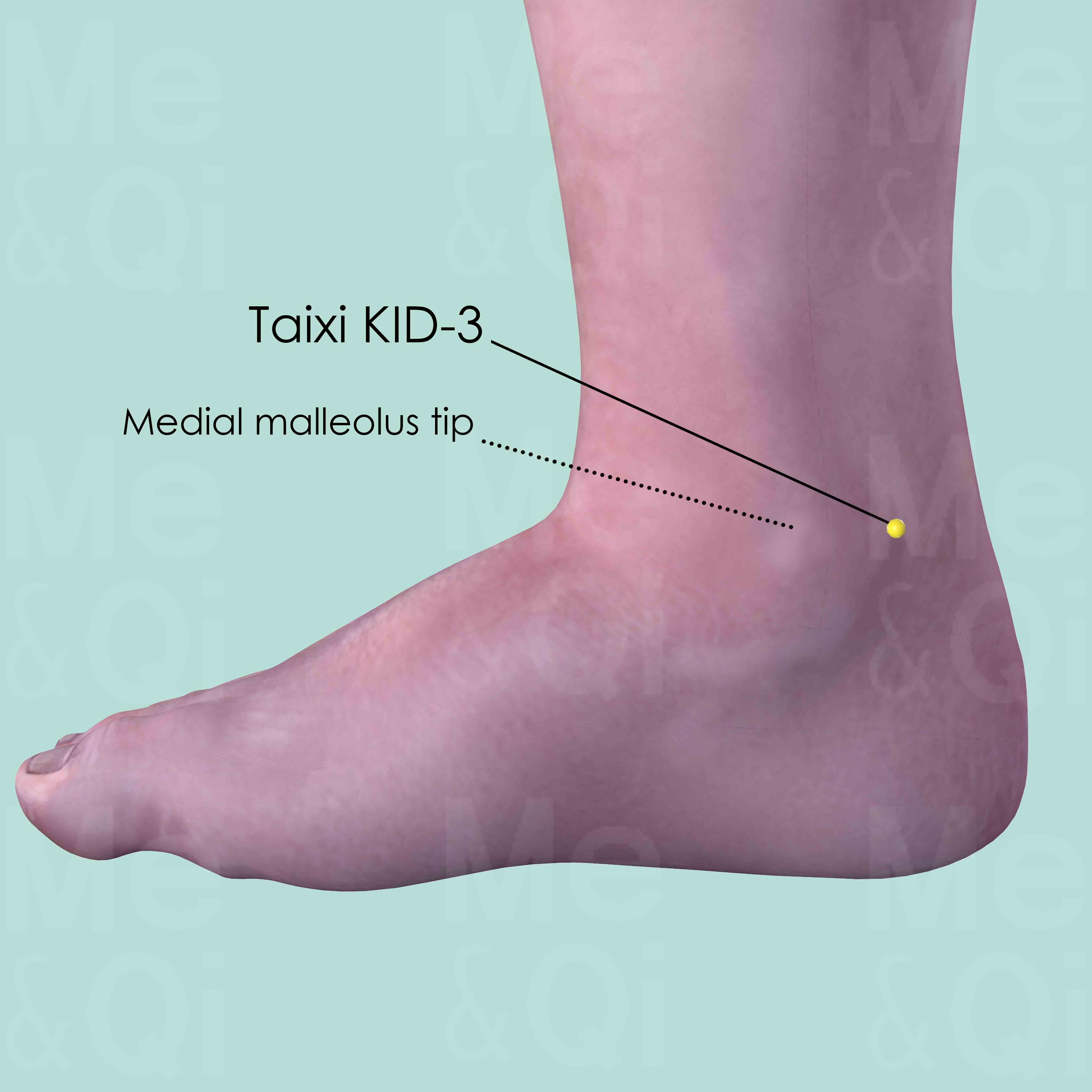
Taixi KID-3
In the depression between the medial malleolus tip and Achilles tendon (Calcaneal tendon), level with the tip of the medial malleolus.
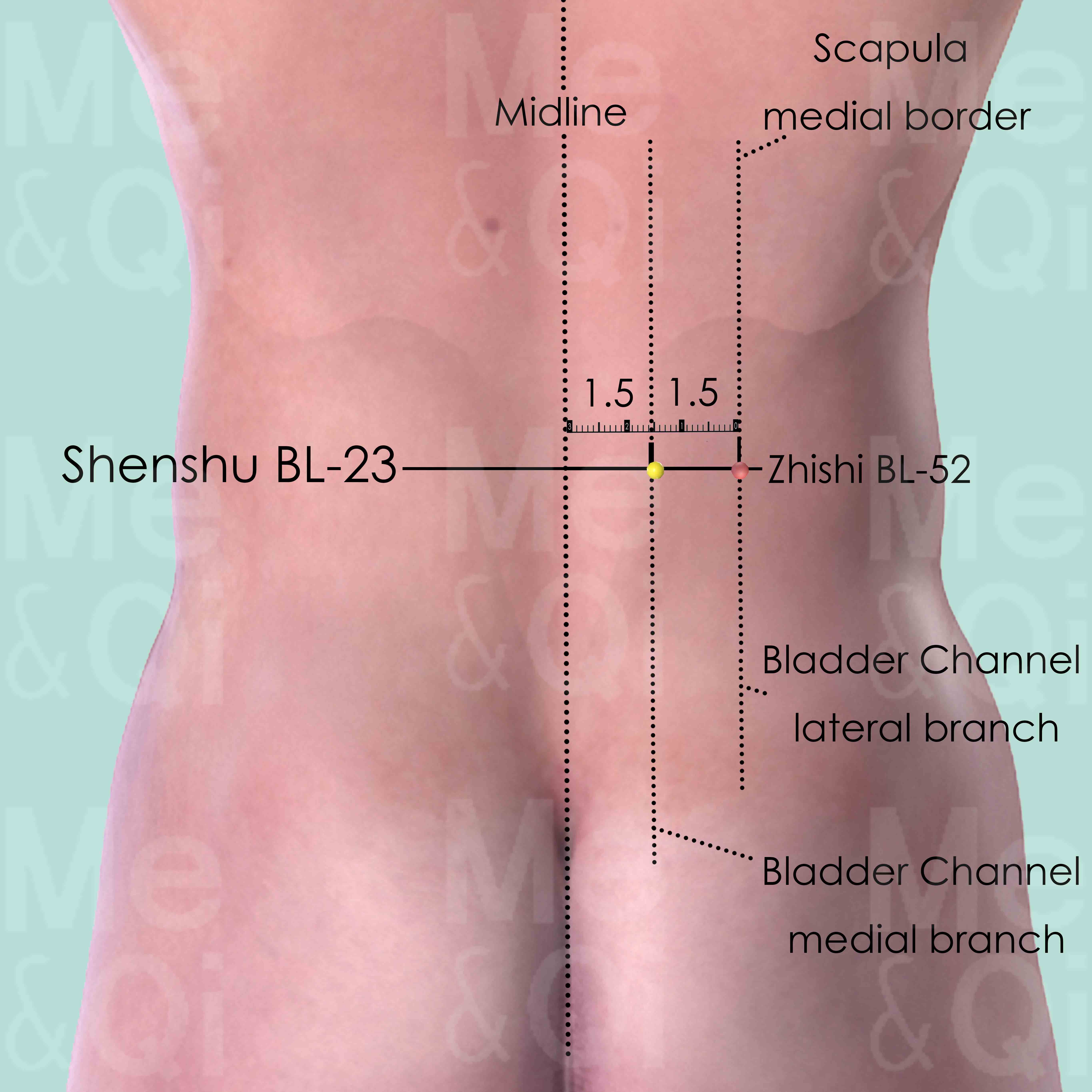
Shenshu BL-23
1.5 cun lateral to the lower border of the spinous process of the 2nd lumber vertebra (L2).
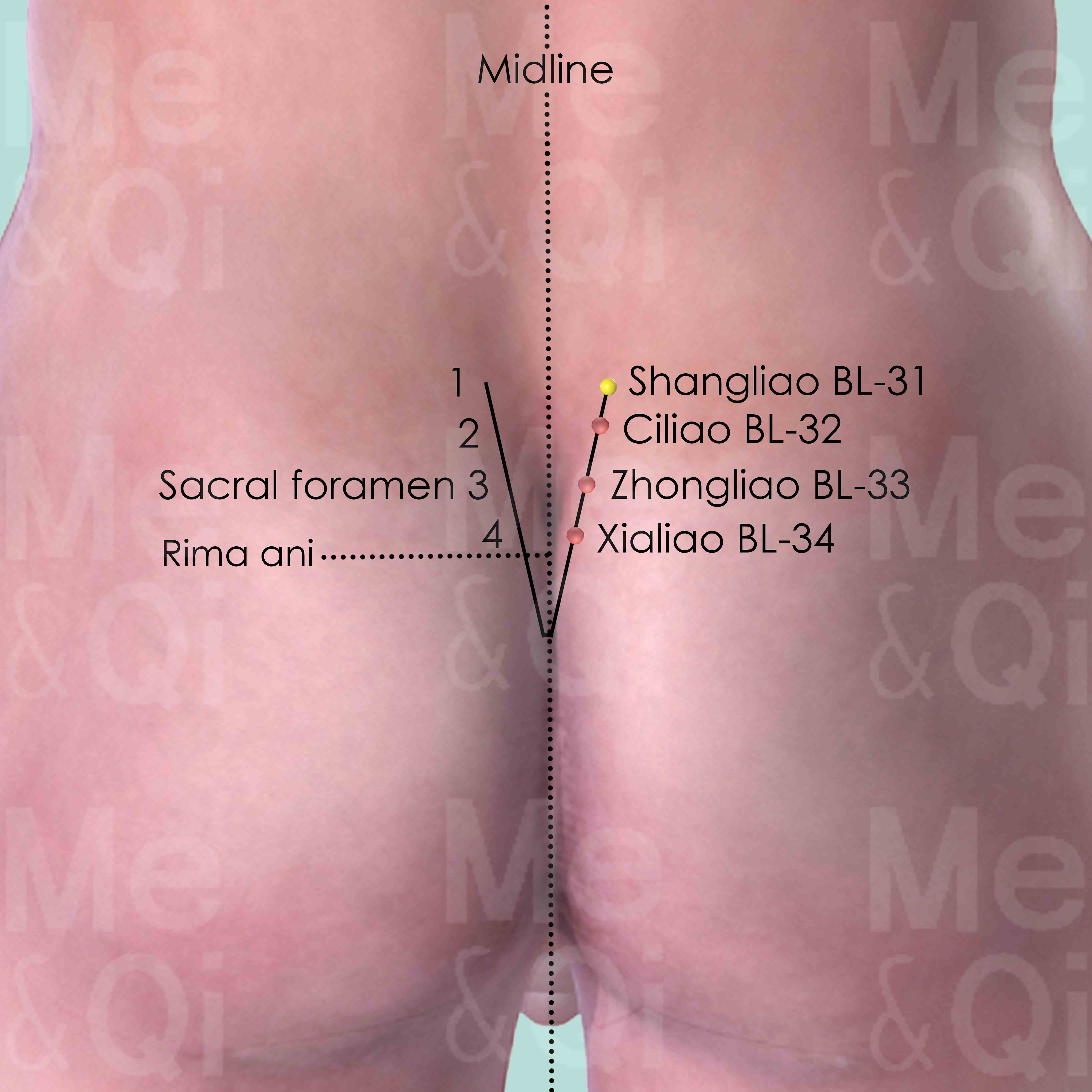
Shangliao BL-31
In the 1st posterior sacral foramen, about midway between the posterior superior iliac spine (PSIS) and the midline.
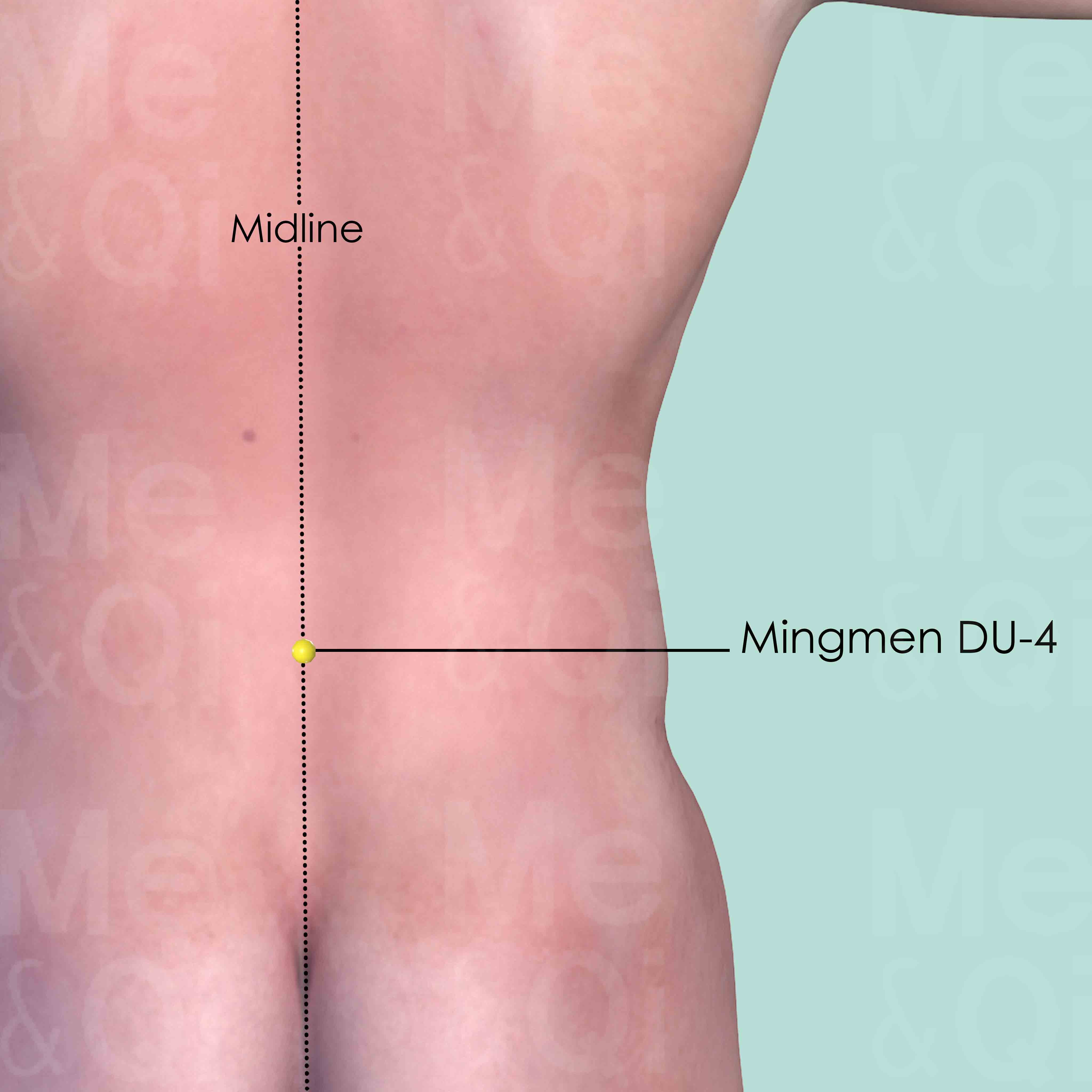
Mingmen DU-4
On the lower back midline, in the depression below the spinous process of the 2nd lumber vertebra (L2).

